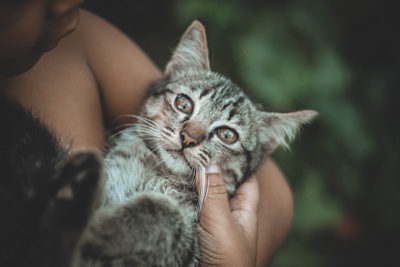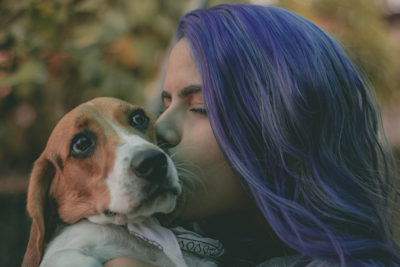The highly personal nature of grieving means that people will cope with loss in their own way. For lots of people, losing a pet is essentially losing a family member, and the pain can hit very hard. Suddenly there’s a fluffy hole in our lives, and we realize how profound their effect and presence on us was.
Unfortunately, many pet parents will not be prepared for how difficult the grieving experience can be, either. That’s why we have put together this post to help you learn how to deal with the grief and get the help you deserve.

Unfortunately, not everyone will “get” the pain that the loss of a pet will cause you. They may not see a pet’s life as significant, but the loss of a pet can be just as hard or even harder than losing a beloved human in your life. It can be harder because of how little support you might receive following the loss and because there is a chance that some people won’t take the loss seriously. They may not realize how much it hurts you, which can be tough to deal with.
Top tip: Don’t surround yourself with people who don’t understand your loss following the death of a pet. Those who aren’t pet parents may not be able to understand why you’re hurting - and this negative energy won’t help you heal.
What we can tell you is that it will help if you put your energy toward those who understand your grief. Find someone in your group of friends who understands what you are going through and who is willing to talk with you about it and provide emotional support. In all likelihood, this will be another pet owner.
One piece of advice we often give grieving pet owners is that their feelings are normal and that they will likely go through the various stages of grief. Keep in mind that this is a process and it can take a while, and it is most often depression that will be the most prolonged part of the grieving process. Your pet played an important role in your life, as a companion, family member and a supportive friend, and you may have spent more time with your pet than any other person in your life, so feeling melancholy after their loss is perfectly normal.
How long your depression lasts will likely depend on how much support you are able to receive from the people around you. Don’t expect to “get over” your pet quickly. It’s okay to get psychological counselling as you try to process the grief and deal with the loss.

Image Source: Unsplash
There are a lot of different ways that you can cope with the feelings you have following the loss of a pet. You should look for ways to express yourself, as this is a natural outlet at this point. Talking to other people is a great way to do that, but the pet experts at We’re All About Cats recommend some other ways as well:
● Create a memorial for your pet and say goodbye properly ● Write a poem or story celebrating their life and your love ● Keep a diary of your feelings and experiences so you can pinpoint triggers and understand your emotions ● Work with a grief counsellor ● Discuss your experience in an online forum with other pet parents, and seek emotional support from people who ‘get it’
Remember: Anything else that helps you get your thoughts and feelings out of your mind and into the open will help. Externalizing your internal process and thoughts will be a big help in enabling you to work through your feelings and to move through the stages of grief. You’re not looking to move on from your pet, necessarily, but rather to get to a healthy mindset and to keep from agonizing over the loss so much.
Read our listings of Pet Poems and Stories that other pet parents suffering from loss have submitted here.
Another important thing to realize is that the process of grief can be a slow one. It can take a long time to start feeling better about your pet being gone, and you shouldn’t expect to get better quickly. It’s fair to say that the first few days and weeks will be the hardest. You won’t know how you will cope without your beloved pet and you will have a lot of bad days. Then, your days are going to start getting better.
Your pet’s memory won’t consume so much of your day, and you’ll be able to get through more of the day without feeling the pain of grief. It will get better over time, but it can take a while to get there. One day, you’ll simply wake up and realize that the loss doesn’t hurt as much, and you will probably have a few realizations like this over time as it gets better.
If you have a job, family responsibilities or some other duties that keep you busy throughout the week, it can help to take some time away from them. You may want to ask for time off work to give yourself time to go through the grief process and to cope with what has happened. You may not be feeling okay by the next day or the next week, and you will need some space and some time to process your emotions and to deal with all the feelings you are having.
If you don’t take the time to process all the different things you need to feel, then there is a risk that they will come back and hit you hard at unexpected times. The pain should get better over time, but only if you allow yourself adequate space and time to experience it.
As you go through the stages of grief, you may have days where you just don’t feel like eating, taking a bath, being with friends or getting any exercise. It’s unhealthy to abandon any of these, though, and you may have to force yourself to do some daily activities and to keep up with your basic needs. The most common basic need that gets abandoned, though, is sleep. It’s tempting to just lie awake thinking unpleasant thoughts or to not bother trying to sleep because of how painful it can be to lie down with no distractions to keep you from thinking about your pet.
However, it is vital that you fulfil your basic needs, because the more you abandon those, the harder it will be to maintain your emotional wellness and mental health. If you are suffering from insomnia, try investing in some natural essential oils to help you relax before bedtime.
Remember, eating right, getting exercise, being with friends and sleeping adequately are all going to help your mental state and empower you to move through the grief stages more effectively. It is important that you take care of yourself, and if you have to make a checklist of what needs to be done each day as just part of basic upkeep, then you should do that. Find the motivation to keep on going and to take good care of your body and mind.
The team at Flemish Giant Rabbit makes a good point about keeping up your routine: “If you have any other pets, then it can really help to spend time with them. You likely have a routine you share with them, like walking the dog, feeding your rabbit, talking to the bird or whatever else you do. It’s good to keep these routines going and maintain the relationship there, as that can help you create a sense of structure and reduce the triggers caused by a pet loss. Remember, they will be mourning too - so don’t forget to be their emotional support while they’re hurting too.”
If you have a new kitten or puppy and don’t feel you can’t care for your new pet adequately because of your grief, it’s worth giving them to a friend, family member or pet sitter until you feel you can give them the attention and love they deserve.
While losing a pet is never easy, it can get easier over time, especially if you put into practice the helpful tips we have listed here, as well as others that your counsellor or friends and family may suggest to you.